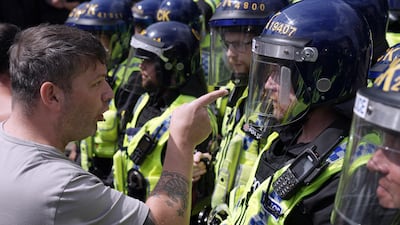Chris Blackhurst: Keir Starmer must bring far-right agitators to heel over race riots
The UK's stretched and unarmed police are taking a “stand back” approach to race riots for fear that entering an unruly crowd would only make things worse, The National has been told.
Prime Minister Keir Starmer said Britain would take “all necessary action” to end successive nights of unrest in which Muslims and refugees have been threatened by far-right agitators and hooligans.
Ministers said 6,000 specialist officers were at the ready as forces in England – one of Europe's most thinly policed countries – worry for their manpower.
But the tear gas, mass arrests, rubber bullets and water cannons that would be typical riot police iconography in some countries are not part of the response in most of the UK.
The usual method is to avoid stepping in unless there is a risk of injury or death, instead collecting evidence so that rioters can be punished later, said a former Metropolitan Police officer.
Suspects have begun appearing in court as the government says magistrates will sit through the night, if necessary, to bring rioters to justice after the event. Chief prosecutor Stephen Parkinson has indicated there could be terrorism charges for far-right agitation.
The former Met officer, crowd control specialist Graham Wettone, said the tactics differed from countries such as Germany, France and Spain where police can be “forceful from the very beginning”.
“In the UK, we’ll tend to stand back, watch, hope we can calm things down with some communications tactics. But if things escalate, then we’ll react to that,” he told The National.
“If you go in and actually lay hands on somebody, people tend to react to that and it can actually inflame a situation.
“Once you’ve extracted them, what are you then going to do with them? You’ve then got to get them to either a safe location or a police vehicle that’s then got to navigate its way out of pockets of disorder.”
Small numbers
Police numbers in England and Wales are among the lowest in Europe relative to population, with 150,000 officers covering 60.9 million people.
The headcount has only recently recovered to 2010 levels after years of budget cuts, with Labour promising to recruit 13,000 more officers.
Labour MP Afzal Khan, a former Greater Manchester Police officer, told The National that forces had lost highly experienced constables after Conservative cuts.
“I feel sorry for the police officers because they've had a difficult time,” he said. “There's been huge cuts in services of 20,000 plus officers. They’ve been allowed to recruit back but you lose all that experience.”
He added that the police had been “doing a good job” in stopping “this criminality terrorising the nation like this”, with exceptional bravery shown at times.
Riots in the UK – in pictures
“If the weather is hot, the gear you are wearing and carrying the shields is not easy. And then when there's hostilities going on as well, the missiles thrown at you, it is very challenging,” he said.
Escalation fears
Mr Wettone, who was deployed in London race riots in the 1980s, said a risk to life is a “line in the sand” where police would have to intervene.
But for less serious violence or verbal abuse, officers will have to decide whether “what they are doing is sufficient for me to inflame this situation”.
Where rioters have been allowed to walk away, detectives say they are hurrying to identify the troublemakers and bring them before a court.

“I can't emphasise enough how impactive it is when you go into a crowd,” Mr Wettone said. “Even if you walk in just to talk to somebody, you get surrounded by people.
“If they're about to set fire to something, clearly the answer is yes, if there are people at risk. If they're setting fire to grass on the ground, no.
“If they're setting fire to roadside furniture, like a fence – provided nobody's at risk, then potentially you would gather the evidence, and if the opportunity arises to arrest them you take it, but mainly you would just let it burn.”
Unarmed tradition
Britain is one of fairly few countries in which police do not generally carry guns. In England and Wales, only 4 per cent of officers are armed.
The use of water cannon was rejected in 2015 by the home secretary at the time, Theresa May, who said they could injure people and fuel social unrest.
Some specialist police can carry Tasers but there have been no reports of their use during this summer's unrest.
Police fired two plastic bullets during a riot in Belfast, where officers do carry guns because of the threat of paramilitary violence.
A YouGov poll published on Tuesday showed majorities in Britain would support the use of water cannon and tear gas on rioters, but only 19 per cent back the use of firearms.
Charges
Mr Starmer, a former chief prosecutor for England and Wales, has been using the lawyerly term “disorder” rather than “riots”.
Violent disorder – which can come with a five-year prison sentence – is the offence that dozens of people have been charged with.
No charges of rioting, a more serious offence that requires 12 or more people to threaten public safety, appear to have been filed.
People affected by rioting under this definition can claim compensation from police commissioners, who said decisions on charging were up to prosecutors.






















